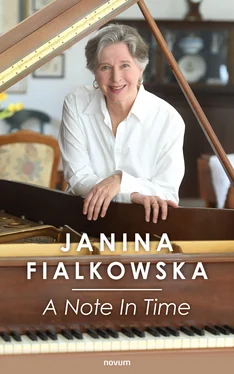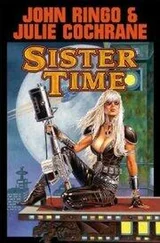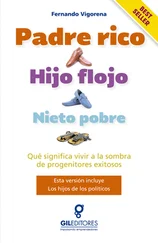Martin played the Schumann Fantasy superbly at the recital and then Roumiana played the Brahms-Paganini Variations followed by Beethoven’s “Les Adieux” Sonata from Gersende and Liszt’s Mephisto-Waltz from Ray.
There had been a terrible dilemma for the snob in Madame on the positioning in the program of the various sponsors of the concert. The biggest donors, by far, were Madame Bernheim and her son-in-law and daughter Marc and Miriam Stein. They were charming people who owned a gorgeous apartment on the Seine where they sometimes hosted “salons” or “house concerts” in which we would take part, and then they would regale us with petits fours from Fauchon. They were absurdly generous to Madame and to her pupils but they were Jewish, and in Madame’s mind this caused a huge problem because the name Bernheim starts with a “B” and if she listed the names alphabetically, Bernheim would come first, ahead of Madame La Princesse “so and so” or Madame la Duchesse “such and such,” whose names began with a letter lower down in the alphabet. I remember her airing this dilemma in a conversation with Biddy who, I am proud to say, was disgusted by the hypocrisy and said so in no uncertain terms to her face. There was a certain coolness between them after that but, like a spoilt child, Madame Lefébure felt that no one could possibly be irritated with her for too long, and she was right of course.
This childlike behaviour was never more evident than when it spilled over into her everyday domestic life.
It had been snowing in Paris all day, and by four o’clock the streets were dark and the sidewalks covered with brown slush. Christmas decorations glittered in the shop windows and there was a smell of burning coal and roasting chestnuts in the air. We had arrived early for my lesson, and the strange concierge had let us in but had forgotten to turn on the lights, so we stood waiting in the dark outside the studio in the chilly antechamber. Presently Mme. Lefébure appeared, complaining bitterly to Freddy all the way up the stairs, although she hadn’t noticed that Freddy wasn’t paying the slightest attention and was telling her that they should have dinner that night at le petit chinois du coin. Exasperated and wiping tears of frustration from her eyes with her little lace handkerchief, she said in a quavering voice: “On aurait cru qu’ils m’auraient avertie; ma bonne était là, ma secrétaire était là, Freddy était là – personne ne m’a dit de me changer de souliers à cause de la neige!”8 Unthinkable! Such selfishness and lack of devotion on their part! It was hard not to start giggling, but she was evidently extremely upset.
Then there was an occasion on which we were all to take part in a competition where Madame was to be a member of the jury (for starters, a peculiar situation to say the least). Exhausted with judging twelve hours a day, she nevertheless ordered us all to come to the studio in the evening so that she could review all our pieces one last time before the finals. Martin, Ray, Roumiana and I arrived in the little antechamber only to hear a Clementi Sonatina being played childishly and extremely badly in the studio. We stood rather surprised and had begun to speculate what the hell was going on, when Freddy rushed in telling us to keep our voices down: “C’est la petite-nièce du General de Gaulle.”9 We all had to wait at least another half hour, Madame’s priorities striking us as being somewhat askew that day.
During my year with Mme. Lefébure there were other events occurring in Paris – trifles such as the May revolution and the fall of de Gaulle – but we were completely oblivious. Looking back, I feel nostalgic for that wonderful sensation of other-worldliness we had created and the total absorption we had in our music. Occasionally I did feel the single-mindedness a bit stifling, so followed, in my all too little spare time, some fascinating courses at the Institut Catholique on the plays of Racine and Victor Hugo. I needed some kind of balance, and this was a way of keeping my mind from atrophying. I also managed to do quite a lot of sightseeing both in Paris and in the outskirts – various fascinating châteaux, the cathedrals of Saint-Denis and Chartres, and Ravel’s country home out in Montfort l’Amaury, which gave me a touching insight into Ravel, the human being. And, of course, I appreciated the restaurants and the food tremendously, growing to love Paris even more than before, if possible.
But Biddy had plans for me and they did not include another year with Mme. Lefébure. Instead, I was to return to and find a teacher in the United States where, in the 1970s, there was a veritable plethora of pedagogical talent. Madame was not at all pleased by this defection and “betrayal” and kept repeating to me that Art languished in the United States and that one only went there to make money.
One of her best and most outrageous statements came after someone had played Debussy in a master class. First, she demonstrated how it really should sound and then, after all of her stooges had “oohed” and “aahed” and had exclaimed that no one could play French music as she did, she nodded pensively, acquiescing and in a voice full of the exhausted resignation of bearing such a heavy burden she said: “Mais oui! Après tout, Gieseking – il jouait la musique française d’une certaine façon, enfin, pas mal; mais, avouons-le, ce n’était pas … enfin, vraiment, il ne jouait pas tellement bien. Mes enfants, au fond, il n’y a que moi!”10
1Basically I am just a little ‘bourgeois’ lady.
2But of course, I was just a very very young girl!
3But my dear, Dinu Lipatti’s recordings, they are all Me!
4Little sister.
5You see, my dear Bridget, when I pass on, it is necessary that I leave something of myself to the world; which is why I give so much of myself to these two darlings.
6Oh! My little prince charming, what joy to have you here.
7Oh! The Old Germany! Freddy, I play Brahms so extremely well! Really I should play him much more often!
8You would have thought that they would have warned me; my housekeeper was there, my secretary was there, Freddy was there – no one told me to change my shoes because of the snow!
9It is the grand-niece of General de Gaulle.
10But yes – after all, Gieseking – he played French music in a certain way, actually not badly – but you have to admit – it wasn’t – well, really he didn’t play all that well. Children, basically, there is only me!
Chapter 4
A Maiden’s Wish (“Zycenie”) by Frédéric Chopin
I left Paris with tremendous reluctance and regret. A year was far too short a time. The elegant streets and boulevards, the patisseries and charcuteries, the language so beautifully spoken, the little corner bistros, the old creaking metro carriages, the Parisians themselves, so opinionated and never at a loss for words, the smells of Gitanes, unleaded fuel, strong coffee and fresh croissants, walks in the Parc de St. Cloud, the disreputable, overweight dogs owned and spoilt by every concierge, the Jeux de Paume, bathed in Water Lilies, the Place Vendome, where Chopin breathed his last, the Seine and all its miraculous bridges, and my new friends and colleagues, Martin, Roumiana, and Ray, had all become very dear to me, and I felt bloody mutinous at being wrenched away from this city of loveliness to start again somewhere else.
In August of l969 I flew down to New York City with Biddy to audition for Sasha Gorodnitzki, playing for him Beethoven’s Sonata opus l09, the Chopin “Funeral March” sonata, the Brahms-Handel Variations, Ravel’s Sonatine and the Bach Prelude and Fugue in E flat minor from Book I.
Without any obvious display of enthusiasm, in fact rather sourly, which was somewhat unnerving, he accepted me into his class. But my mother was unhappy about the idea of my living in New York so, after the relative freedom of Paris, I found myself once again back at home, in isolation, under her watchful – almost tyrannical – eye, flying down to New York every two weeks for a two-hour lesson alone with Mr. G. I didn’t feel unhappy, but a certain tension was developing between my mother and me; she was reluctant to relinquish her control over my life and I was longing for more independence. Certainly my natural shyness intensified during this period, and so I became totally withdrawn and alienated from the society of my generation. When not chained to the keyboard, I had for entertainment my father, with whom I would discuss current events and politics, my dogs, who acted as walking companions, and my books. I was too caught up in my work to contemplate how peculiar my life was compared to that of my old school contemporaries and, besides, I had a new goal: to participate in the famous International Chopin Competition, to be held in Warsaw in the fall of l970. This was actually a dream of my father’s which I had wholeheartedly embraced, and Mr. G., despite knowing full well that I was totally unprepared to take on the responsibilities of winning such a prize, reluctantly agreed to my pleas. A top prize at the Chopin competition in 1970 would have catapulted a young artist into a major concert career, and at nineteen I had neither the repertoire nor the performing experience to take on such a challenge. In the end, Mr. G. probably thought it would be a good learning experience for me, so we painstakingly prepared every piece for the competition until he was more or less satisfied with the result.
Читать дальше












